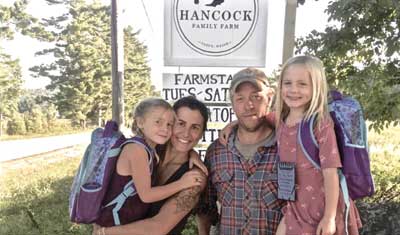 |
| Geoff and Gina Hancock make guitar pedals and straps, respectively. Photo by Holly Hancock |
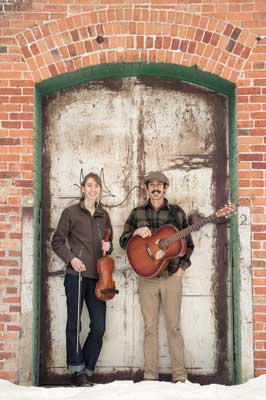 |
| Johanna Davis and Adam Nordell travel the country as the two-piece band Sassafras Stomp during the off-season. Photo by Rab Cummings |
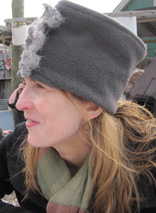 |
| Heather Selin of Earth Dharma works off-farm as a policy expert for tobacco use reduction. Photo by Stowell Watters |
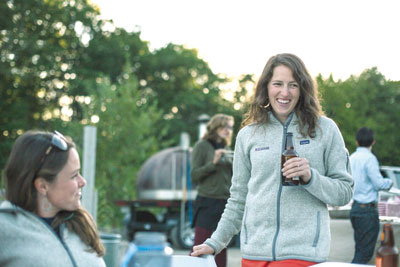 |
| Abby Fisher works in human resources at Allagash Brewing. Photo by Matt Whalen |
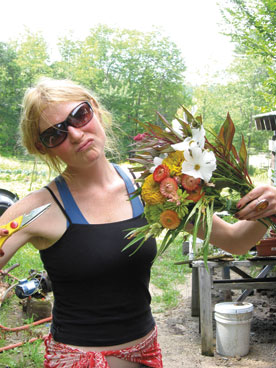 |
| Katie Doyle Smith weaves farm experiences into her comedy shows. Photo by Paul Swegel |
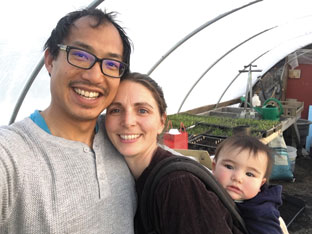 |
| Rich Lee (left) does carpentry during the off season. Photo by Rich Lee |
By Stowell P. Watters
Look at any farm growing any product in any place, from blueberry barrens in Washington County to Taro farms in Hawaii, from citrus groves in Georgia to corn fields in Nebraska, and even from diversified organic vegetable farms here in New England to diversified organic vegetable farms in California: No two are identical, just as no two farmers are the same. Independence is the lifeblood of farmers, and curiosity is their daily bread.
Farmers are artists, firefighters, doctors, pastors, surfers, politicians, writers and even bankers. The fact that the farmer has no boss to report to and that the farm is such a personal and therefore personalizable creation means that farmers can make a living however they choose. They can grow all season long here in Maine, erecting great tunnels to keep greens right through December; they can take the winter off and read by the fire or strap the skis to the car and set out for the slopes; or they can pursue a second job, a second income, a second passion. This story looks at a few farmers who have taken on fascinating off-farm, off-season jobs.
Geof Hancock is a farmer and self-described noise-freak and pedal-head, with a focus on “sonic landscapes” and “heavy fuzz stuff.”
Translated, Hancock designs and manufactures guitar pedals when he and his wife are not farming their MOFGA-certified organic Hancock Family Farm in Casco, Maine. A guitar pedal is a device that alters the sound of an electric guitar before that sound is released through an amplifier. Hancock sells his creations under the name Farm Pedals, with a busy Instagram account, a steadily growing fan base, and even customers in the metal music capital of Norway.
“Just because I am an organic farmer doesn’t mean I don’t like to shred,” he says.
Musicians hunting certain sounds and vibes that cannot be attained through the instrument alone seek craftsmen like Hancock, who designs original and custom pedals using an ever-expanding knowledge of soldering, schematics, electronics and good old-fashioned music appreciation.
“It begins with noise,” he says. “I like loud things, I love tractor work, I like saw mills and I love loud music … so making pedals, it’s the same do-it-yourself ideology as farming; it all fits together.”
In the summer Hancock is a full-time farmer, from sunup until sundown. He and his wife, Gina, their two daughters, and a host of summer interns churn out enough produce for two markets, a CSA and a busy roadside stand. But when the weather turns and the farm stand is boarded up, both Geof and Gina turn to their off-farm jobs.
“We see other farms [growing all season] and I am so impressed,” says Gina, who makes guitar straps. “But for us, we need that winter break emotionally and physically. It’s just kind of fun to learn new things and expand our interest outside of growing, so I sew some straps, and Geof makes the pedals, and yeah, it works for us,” she says.
Music has always had a place within the agrarian sphere – from the bucolic classical music of Edvard Grieg or Vivaldi or Tchaikovsky, to the Farm Aid tunes of Willie Nelson and Neil Young, to the foot-stomping fiddle music of Appalachia. On MOFGA-certified organic Songbird Farm in Unity, Maine, farmers Johanna Davis and Adam Nordell continue this tradition, traveling the country as the two-piece band Sassafras Stomp between growing seasons. (See Holli Cederholm’s feature story on the couple in the fall 2016 issue of The MOF&G.)
“Our love is old-time Appalachian-style music, but we play a lot of other traditional tunes too,” Davis says.
Davis plays fiddle; Adam, guitar and banjo. Last Thanksgiving they departed Maine in their Subaru for a 10,000-mile trip to Seattle, stopping to perform at house shows, dances and concerts along the way. Over the last few years, this has become the ritual, with songwriting, recording and farming in between. Last year they released an album of all original material titled “Walk These Fields,” a celebration of small farms and their connection to the land.
“We are really lucky; we get to draw inspiration from our work on the farm and then we go share that with friends through our music; we share our life with our music,” Davis says.
Heather Selin and her husband, David McDaniel, live in Jackson, Maine, where they grow wine grapes, seed garlic, vegetables and heirloom grains on their Earth Dharma Farm. (See my feature on Earth Dharma in the winter 2015-2016 issue of The MOF&G.) While McDaniel farms full-time, Selin works part of the year as an international policy expert for tobacco use reduction. She develops materials and workshops for the World Health Organization, the International Union Against Tuberculosis and Lung Disease, and others to help governments create programs to regulate smoke-free environments, make cities smoke-free, address packaging and labeling issues, and apply for grants for tobacco use reduction.
Smoking skyrockets a country’s healthcare costs and is the leading cause of preventable death worldwide, not just in the United States. Selin has worked with governments in Mexico, Jamaica and Paraguay, and spends much of her time in her car, a roving policy expert and part-time farmer, working to encourage regulation and tax increases to fight Big Tobacco.
Often farmers are affected by wide-reaching regulation and governmental policies that benefit large corporations or manufacturers of agricultural products such as pesticides and fertilizers. Selin believes, although she works primarily with reducing tobacco use, that our local food issues intersect with her work.
The Federal government “heavily subsidizes large monocrop farming, and so the tactics to try and change those policies to promote and reward small farmers that are good stewards of the land are the same tactics we use in fighting big tobacco,” she says.
Abby Fisher is one of four farmer-owners of Bumbleroot Farm in Windham, Maine. Together they grow MOFGA-certified organic vegetables for sale at markets in Portland, Saco and Kittery and offer a vegetable CSA share.
Fisher also works as a human resources generalist for Portland-based Allagash Brewing Company, one of Maine’s most lauded, famous and largest breweries. Her job is to welcome new employees and help them get accustomed to working at Allagash. This kind of work, she says, is extremely useful as the farm looks to hire its first full-time employee this year.
“I feel like it’s nice to have a person who is outside of the day-to-day farm, just to weigh in, keep it fresh, a different perspective, like – How can we make working on Bumbleroot Farm a really great experience?” she says.
For Fisher, working at Allagash produces a number of translatable skills: She writes both the Allagash and Bumbleroot newsletters, she works with a wide variety of managers and management styles, she coordinates events, and, oh yeah, she gets beer.
“By the time I get home, these guys have been working together for 11 hours, and I get home so happy to be back on the farm. [I ask,] What are we doing? Making bouquets? Awesome! Let’s have a beer!” she says.
When Katie Doyle Smith was young she dreamed of being a comedian on Saturday Night Live – not of transplanting tomatoes and kale; but that became her life and her passion as she grew, met her husband, Paul Swegel, and started Pork Hill Farm in Ossipee, New Hampshire. Pork Hill is certified organic by the New Hampshire Department of Agriculture, Markets & Food.
Smith’s youthful dream has reemerged as she has found herself doing what comedians do best: finding the funny.
“So many things happen in the world of farming – all the wild characters, the packing shed, there is just so much humor, infinite material,” she says, adding, “I could probably do a whole set about farmers’ markets.”
After performing a handful of times in Portland she has high hopes for more work on stage, made possible by work on the farm. Whether she is driving from farm to market, transplanting seedlings for hours at a time, or pulling weeds, the farm gives her the mental space to work on her comedy, and that freedom allows her to pursue both careers simultaneously.
Carpentry is an invaluable skill both on and off the farm. Just ask Rich Lee of MOFGA-certified organic Tender Soles Farm in Richmond, Maine. The farmer and carpenter runs the horse-powered farm with his wife, Kate Del Vecchio, and in winter both pursue off-farm jobs. Last winter Lee worked with a father-and-son team to build a lighthouse.
Well, not a real lighthouse, but a replica of the old Portland Head Light lighthouse that the team will take apart and reassemble to go on display this summer at the Maine Maritime Museum in Bath. Their replica is 18 feet tall, 12 feet wide and built with wood and 30 tons of metal. It has a motor in it as well as housing for the original Fresnel lens, so when it is on display they can fire it up. The team took all winter to complete it, working out of a temporary shop they erected in Cape Elizabeth just to house the massive project.
“I really enjoy the change of pace that the off-farm job provides,” says Lee.
For many farmers, that change seems to be key: Taking a break from the 60-hour work weeks of summer helps them reset and arrive back on the farm in spring refreshed and ready for a new season. At Tender Soles this is true for all workers, even the horse and its pasture mate.
“They work hard all summer, so they need to change it up in the winter too, so we let them rest,” Lee says. “For us, it’s about balancing the farm work with the off-farm work, keeping all the balls in the air and making it work.”
Farming takes the backbone of a laborer and the heart of an artist. No single path spits out a successful farmer, just as no formula defines a perfect farm. The profession favors the hardworking and vigilant, but also the independent, creative and compassionate. In this way farmers are free to shape their creation however they want, tending to the land and their own hearts and making a living while they’re at it.
About the author: Stowell P. Watters, a former MOFGA journeyperson, runs MOFGA-certified organic Old Wells Farm with his family in Limington, Maine.
